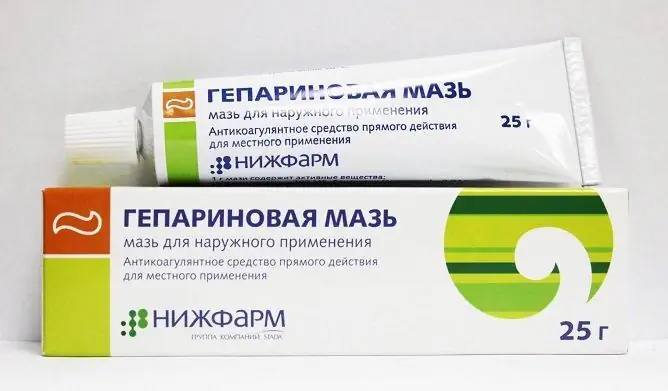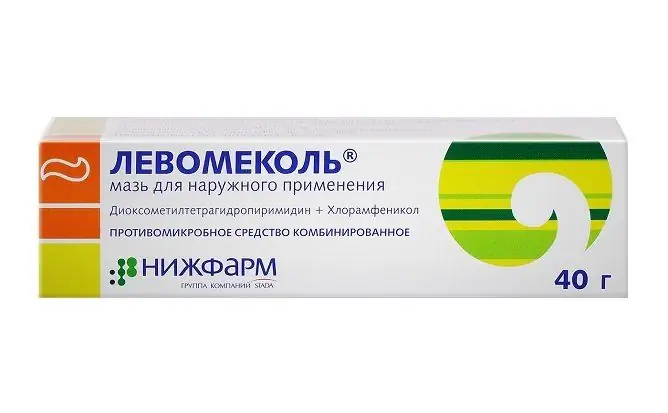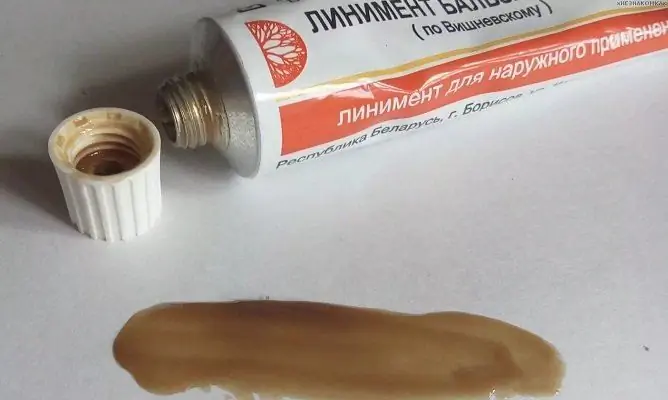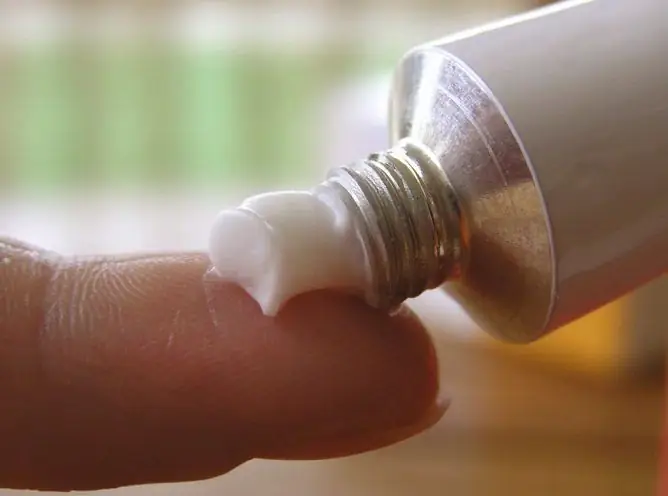- Author Rachel Wainwright wainwright@abchealthonline.com.
- Public 2023-12-15 07:39.
- Last modified 2025-11-02 20:14.
Heparoid Zentiva
Heparoid Zentiva: instructions for use and reviews
- 1. Release form and composition
- 2. Pharmacological properties
- 3. Indications for use
- 4. Contraindications
- 5. Method of application and dosage
- 6. Side effects
- 7. Overdose
- 8. Special instructions
- 9. Application during pregnancy and lactation
- 10. Use in childhood
- 11. Drug interactions
- 12. Analogs
- 13. Terms and conditions of storage
- 14. Terms of dispensing from pharmacies
- 15. Reviews
- 16. Price in pharmacies
Latin name: Heparoid Zentiva
ATX code: C05BA01
Active ingredient: heparinoids (Heparinoids)
Manufacturer: Zentiva k.s. (Zentiva, ks) (Czech Republic)
Description and photo update: 2019-05-07

Heparoid Zentiva is a drug for external use with antithrombotic and anti-inflammatory effects.
Release form and composition
The drug is available in the form of an ointment for external use: an almost white or white oil-in-water emulsion mass (30 g each in aluminum tubes, 1 tube in a cardboard box and instructions for use of Heparoid Zentiva).
30 g of ointment contains:
- active substance: heparinoid [activity 100 IU (international unit) per 0.001 g] - 0.06 g;
- auxiliary components: stearic acid, solid paraffin, white beeswax, liquid paraffin, ethoxylated fatty alcohols (C 12 -C 14), cetyl stearyl alcohol (60% cetyl alcohol, 40% stearyl alcohol), distilled monoglycerides, trolamine, propyl parahydroxybenzene methyl parahydroxybenzoate, purified water.
Pharmacological properties
Heparoid Zentiva is an anti-thrombotic drug for external use, has anti-inflammatory, anti-exudative and anticoagulant activity.
The active ingredient of the drug is heparinoid, which is a sulfated high molecular weight compound. Its anticoagulant and lipolytic effect is due to its ability to activate lipoprotein lipase and potentiate the breakdown of fatty acids from lipoproteins. When applied topically, it reduces the increased blood clotting in the damaged area due to trauma or inflammation, prevents the formation of blood clots. Promotes acceleration of resorption of hematomas, reduces swelling. Thanks to the local anti-inflammatory action, the feeling of pain and tension is reduced.
Indications for use
The use of Geparoid Zentiva ointment is indicated for the treatment of the following conditions and diseases in adults and children (starting from infancy):
- phlebitis / thrombophlebitis of superficial veins of various origins and localization (including varicose veins of the lower extremities and chronic venous insufficiency, complicated by phlebitis, periflebitis, thrombophlebitis, trophic ulceration);
- periflebitis accompanying trophic ulcer of the leg;
- hemorrhoids, except in cases of exacerbation, accompanied by bleeding;
- local complications after phlebosclerosing treatment, softening of keloid tissue in cases of hypertrophic scarring;
- post-traumatic edema, tendovaginitis, soft tissue bruises, hematomas, tendon / ligament sprains.
Contraindications
- diseases / conditions with a tendency to bleeding, including hemorrhagic diathesis, thrombocytopenia, hemophilia, various forms of purpura;
- during pregnancy (I - II trimester) and breastfeeding - for long-term use or applying ointment to large areas of the skin;
- pregnancy period (III trimester);
- hypersensitivity to the components of the Heparoid Zentiva ointment.
Heparoid Zentiva, instructions for use: method and dosage
Ointment Geparoid Zentiva is applied externally, applying to the affected area of the skin of the body, capturing the adjacent areas, and rubbing gently until completely absorbed.
When treating a trophic ulcer of the leg, the ointment should be rubbed only around the affected area.
In case of extensive hematomas, the use of an impermeable dressing is indicated on the areas treated with ointment, preferably at night. A pressure bandage for vein diseases can be applied along with the drug.
Recommended dosage: 1 mm layer of ointment 2-3 times a day with an interval of 4-5 hours between treatments. The duration of the course of treatment is from 7 to 14 days, if there is no individual doctor's prescription.
In case of vein diseases, the appointment of Heparoid Zentiva is usually part of complex therapy, which involves the simultaneous use of other drugs, the imposition of a pressure bandage or wearing an elastic stocking.
If during the treatment of soft tissue bruises after three days of using the ointment there is no positive dynamics or symptoms of side effects are observed, then the treatment should be discontinued and consult a doctor.
Side effects
- infrequently: local skin irritation in the form of slight redness, itching and / or skin rashes;
- rarely: hypersensitivity reactions;
- very rare: in cases of use in large areas and in high doses - hemorrhagic complications.
Overdose
Symptoms of a topical heparinoid overdose have not been established.
Accidental ingestion of the ointment can cause nausea, vomiting. In such a situation, immediate gastric lavage or artificial vomiting is indicated and a visit to a doctor is indicated.
special instructions
Do not allow the ointment to get into the eyes, on mucous membranes, an open wound surface or areas with impaired skin integrity.
Usually Geparoid Zentiva is well tolerated, in cases of the appearance of symptoms of undesirable side reactions, its use should be discontinued and a doctor should be consulted.
You can not use Heparoid Zentiva for more than 14 days without consulting a doctor.
Influence on the ability to drive vehicles and complex mechanisms
Treatment with Heparoid Zentiva does not affect the patient's ability to drive vehicles and perform other activities that require increased attention or high speed of psychomotor reactions.
Application during pregnancy and lactation
The use of Heparoid Zentiva in the last trimester of pregnancy is contraindicated due to the increased risk of bleeding during childbirth.
In the I-II trimester of the gestation period and during lactation, you cannot use the ointment for a long time or apply it to large areas of the skin.
It is allowed to use the ointment only in clinically justified cases as directed by a physician in compliance with the recommended dosage.
Pediatric use
In pediatric practice, the use of Heparoid Zentiva is allowed according to indications for the treatment of children, starting from infancy.
Drug interactions
It is not recommended to use Geparoid Zentiva in combination with other medicines without first consulting a doctor.
The simultaneous application of drugs for external use containing tetracycline, salicylic acid or hydrocortisone to the affected area is contraindicated.
It should be borne in mind that when combined with anticoagulants, it is possible to enhance their anticoagulant effect, therefore it is recommended to exercise increased caution and conduct careful laboratory monitoring of the blood picture.
Analogs
The analogues of the Geparoid Zentiva are Heparinoid, Alipril, Emeran, Geparoid Lechiva, Emeran, Girudoid, Heparin ointment, Lyoton, Trombless, Girudoprokt, etc.
Terms and conditions of storage
Keep out of the reach of children.
Store at temperatures up to 25 ° C.
The shelf life is 3 years.
Terms of dispensing from pharmacies
Available without a prescription.
Reviews of the Heparoid Zentiva
In reviews of Heparoid Zentiva, most patients indicate the effectiveness of the drug in the treatment of the initial stages of thrombophlebitis or phlebitis of superficial veins, as well as the absence of side reactions.
At the same time, some patients report an almost complete absence of the expected clinical effect after applying the ointment for the recommended period. However, they argue that other drugs of similar action have been very effective.
Price for Geparoid Zentiva in pharmacies
The price of Heparoid Zentiva, an ointment for external use, for 1 tube of 30 g can be from 185 rubles.

Anna Kozlova Medical journalist About the author
Education: Rostov State Medical University, specialty "General Medicine".
Information about the drug is generalized, provided for informational purposes only and does not replace the official instructions. Self-medication is hazardous to health!






